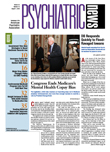When I was a resident, the chair of our department was the president of APA. He seemed to exist in another sphere, always on very important long-distance calls to other very important people. Later, I got to know several APA presidents. As the chair of an APA commission, I got closer; I watched APA presidents empanel work groups, set the agenda for board meetings, attend international meetings, bestow presidential awards, hold invitational meetings, choose speakers and presentations for “their” APA meetings, speak for APA on television. The president always seemed to be surrounded by crowds of admirers. It was awesome.
As an officer of APA, I had the opportunity to participate in the activities of successive presidents. Our system, under which there is a president-elect year before the presidency itself, allows time to plan ahead, and, as soon as I was elected, I did. I chose themes and considered topics for the Institute on Psychiatric Services and the annual meeting during my term. We engaged the Convocation speaker for our meeting in San Francisco next May: Atul Gawande, M.D., a brilliant, thoughtful, and engaging Harvard physician who has compelling ideas about improving the practice of medicine. I thought about ways the components and Board of Trustees could function more effectively. I attended, as an ex officio member, the board meetings of our subsidiaries: American Psychiatric Publishing, American Psychiatric Foundation, and American Psychiatric Institute for Research and Education. I visited district branches around the country.
It was still a shock to find myself, at 5 p.m. on the last day of the 2008 annual meeting in May in Washington, D.C., the actual president of APA. Up until that moment, I could express my opinions knowing that the decision lay with my predecessor. There are a few thorny problems right now; not surprisingly, some people are dissatisfied with the DSM-V process, the FDA recently held hearings about anti-convulsants and“ suicidality,” psychiatrists' relationships with the pharmaceutical industry are under scrutiny—and now the buck stops with me.
The job turns out to be more about duty than authority. I don't make APA policy. The Assembly and the Board have the authority and responsibility to make those decisions. It is my responsibility to get the members of the Board—and all APA members—the information they need to decide how to react in the case of urgent questions and to see that the most important issues are addressed and all perspectives are heard. I have the “bully pulpit”; I can speak with the weight of APA, but I have to respect APA policy, and I have to be very careful about everything I say—because everything I say carries the weight of APA.
Making appointments to fill open positions on our components was a big challenge. I had made no promises, but there are more candidates than positions, and it is difficult to find out whether candidates one doesn't know are fully qualified. I wanted to appoint members who were hard working and knowledgeable, and I wanted to make sure that our minority, women, resident, and early career psychiatrists were well represented and that component members had a wide variety of perspectives. I had to disappoint some dedicated members who are dear friends.
My presidential duties take more time than a full-time job. I am available 24/7; the media and Congress do not shut down every night and on weekends. We might have to respond to a tragedy like the shootings at Northern Illinois University or address last-minute changes to legislation. I don't have a secretary. Just making travel arrangements for the trips I have to take nearly every week takes hours. I receive about 150 APA-related e-mails each day. I read every one, and so far I have also been able to respond to every member who has written to me. Under the leadership of Medical Director Jay Scully, our APA staff is a dedicated group. When I send e-mails to a member of the staff in the evening or over the weekend, not expecting an answer until Monday, most of them respond within hours.
Recently, in the midst of some pesky problem, I started to mutter,“ They don't pay me for this.” Then I remembered that you do pay me. The president receives an honorarium of $126,823.98. I am trying my best to give you and our beloved association your money's worth. ▪

